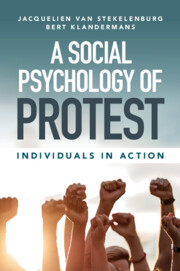Book contents
- A Social Psychology of Protest
- A Social Psychology of Protest
- Copyright page
- Contents
- Figures
- Tables
- Acknowledgments
- Chapter 1 Introduction
- Chapter 2 The Legacy of the Past
- Chapter 3 What Is Contextualized Contestation?
- Chapter 4 Dynamics of Demand
- Chapter 5 Dynamics of Supply
- Chapter 6 Dynamics of Mobilization
- Chapter 7 Context Matters, But How?
- Chapter 8 Should I Stay or Should I Go?
- Chapter 9 Politicization, Polarization, and Radicalization
- Chapter 10 Conclusion
- References
- Index
Chapter 3 - What Is Contextualized Contestation?
Published online by Cambridge University Press: 23 November 2023
- A Social Psychology of Protest
- A Social Psychology of Protest
- Copyright page
- Contents
- Figures
- Tables
- Acknowledgments
- Chapter 1 Introduction
- Chapter 2 The Legacy of the Past
- Chapter 3 What Is Contextualized Contestation?
- Chapter 4 Dynamics of Demand
- Chapter 5 Dynamics of Supply
- Chapter 6 Dynamics of Mobilization
- Chapter 7 Context Matters, But How?
- Chapter 8 Should I Stay or Should I Go?
- Chapter 9 Politicization, Polarization, and Radicalization
- Chapter 10 Conclusion
- References
- Index
Summary
Social psychology is interested in how social context influences individuals’ behavior, focuses on subjective variables, and takes the individual as its unit of analysis, which has important epistemological implications. It implies, inter alia, that questions that take a unit of analysis other than the individual (e.g., a movement, a group, a region, or a country) require other disciplines than social psychology. Hence, social psychology should fare well at explaining why individuals participate or fail to participate in a movement once it has emerged but is not helpful in explaining why social movements emerge or decline. Sociology and political science are better suited for such analyses. Although sociology and political sciences usually do their analyses at levels different than that of the individual, they do build their reasoning on assumptions about individual behavior. This is not to say that every social scientist must become a social psychologist, but it is to say that it is worth the effort to specify the social psychological assumptions that underlie the analyses and to see whether they fit into what social psychologists know about individual behavior. We delineate our disciplinary point of departure and build our model of Contextualized Contestation along the lines of Coleman’s boat.
Keywords
- Type
- Chapter
- Information
- A Social Psychology of ProtestIndividuals in Action, pp. 46 - 60Publisher: Cambridge University PressPrint publication year: 2023



